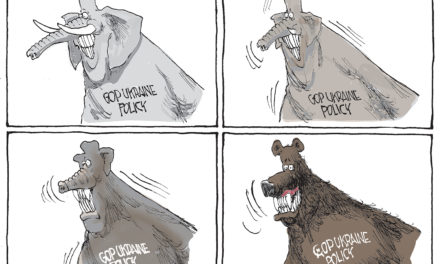It’s hard to remember all the times committees have set out and failed to analyze/reform/rationalize our local PILOT program but there is greater hope this time because a committee of the Shelby County Board of Commissioners is showing its seriousness at getting to greater accountability than previous hearings.
That’s because it’s the Core City, Neighborhoods, and Housing Committee headed by Henri E. Brooks and Britney Thornton, respectively chair and vice-chair. From all appearances, they are intent on cutting through the cheerleading by the usual suspects and evaluating PILOTs for their equity, measurable impacts, fairness, and tax policy implications.
Only a few of us are adamantly and totally against PILOTs, and I’m not one of them, but all of us are for policies and programs that ensure that every dollar of taxes that a company does not have to pay is a wise investment.
After all, every dollar given away in an excessive PILOT is a dollar that can’t be spent on workforce development, education, quality of life, public transit, public health, and other drives of a successful economy.
It only makes sense for this oversight by the county’s legislative body. After all, it is the board of commissioners that delegate the power to waive taxes to the Shelby County Industrial Board in the form of EDGE and the Center City Revenue Finance Corporation, both of which have also been delegated the power to waive taxes from Memphis City Council. Shelby County also give tax break power to its Shelby County Health, Education and Housing Facility Board.
However, there are six other agencies that can grant PILOTs that allow companies a holiday from paying county taxes. Industrial Development Boards in Arlington, Bartlett, Collierville, Germantown, and Millington are independent of Shelby County’s delegation of powers and were created in accordance with State of Tennessee law, such as Section 48-60-106. All of the towns’ Industrial Development Boards have the power to waive Shelby County taxes every time they waive their own with a PILOT. The same goes for the Memphis Health, Educational and Housing Facility Board, which also can waive county taxes independent of any oversight by Shelby County Government.
Problem Areas
Among the towns, Collierville is by far the most profligate which was again demonstrated recently when Campell’s Clinic was awarded a six-year, $1.5 million PILOT although the clinic had already bought its property and its building was already under construction. No one could make the argument with a straight face that Campbell’s Clinic would not have built a Collierville facility “but for” the PILOT.
Collierville Sets Standard For Wasteful Tax Breaks
Every time an agency like these in the towns approves a tax break, it gives away property tax that would otherwise be paid to Shelby County Government. For example, Campbell’s Clinic waived $164,000 a year of county taxes for six years. The town’s share was much less – $89,000.
That’s why Collierville likes to waive county taxes. It’s two-thirds of the tax break that it doles out to companies. With Memphians paying the largest percentage of the county taxes, it essentially means that when Collierville gives PILOTs to companies moving out of Memphis and into the suburban town, Memphians are essentially funding a company that is merely changing its zip code and removing existing taxes that fund Memphis services. Every PILOT should have a public purpose but it’s difficult to explain these.
Another nagging problem is with the Memphis Health, Educational and Housing Facility Board, which ranks third in the most Shelby County taxes waived by one of the nine agencies with PILOT power. Meanwhile, it is plagued by complaints about PILOTs to developers who fail to deliver safe, sanitary, living conditions – think Memphis Towers and Hope Heights.
The Intertwined Crisis of Housing, Evictions and Poverty
The commissioners currently asking these questions should expect answers from the agencies in the form of the customary dog and pony shows with incomplete context and data points, but here’s the main thing: Memphis and Shelby County are underperforming when compared to its peer cities. Even the Greater Memphis Chamber admitted this with its MemMeasures report which showed our community ranking low when it came to “economic foundations – foundations for thriving households.” When compared to nine peer cities, Memphis ranked 10th (last) in broadband connectivity, seventh in job proximity, ninth in housing burden, last in food insecurity, and ninth in STEM graduates. Economic outcomes showed Memphis in sixth place in employment rate gap and the second worst in income inequality.
These underscore the concern about our tax incentive policies. In 30 years, they have not improved Memphis’ fundamental economic indicators. In fact, the indicators have gotten more troubling, raising the question about how a better PILOT program could be transformed to an actual incentive from what it is now, an entitlement.
Meanwhile, 42% of African American workers in Memphis earn less than $15 an hour and median incomes in White households in Shelby County earn twice as much as Black households, the same as it was when Dr. King was murdered here more than five decades ago.
All in all, it raises the fundamental question: Are PILOTs keys to our community’s economic growth or are they starving the very services that will define the future? And why are the number of PILOT contracts approved here more than Davidson County/Nashville, Hamilton County/Chattanooga, and Knox County/Knoxville – cumulatively times four.
Tale of the Tape
Shelby County Trustee Regina Morrison Newman recently released her report on PILOTs for 2023. Here’s the amount of tax breaks given by each agency last year:
$17,660,061 – EDGE
$10,231480 – Downtown Commission’s Center City Revenue Finance Corporation
$7,004,933 – Memphis Health, Educational and Housing Board
$4,056,663 – Industrial Development Board of Collierville
$946,831 – Shelby County Health and Education Facilities Board
$550,946 – Industrial Development Board of Germantown
$256,031 – Industrial Development Board of Millington
$157,344 – Industrial Development Board of Bartlett
$129,920 – Industrial Development Board of Arlington
Altogether, in 2023, it means that $41,424,084 in Shelby County property taxes were waived by agencies.
In other words, at that amount, every 10 years, these nine agencies will have waived $414 million in Shelby County taxes. A rough calculation indicates that $180 million of that total would have otherwise gone to support school districts in Shelby County.
Questions and Recommendations
There are many questions to be asked about the various PILOT programs in Shelby County, and here’s questions and recommendations that deserve answers:
- Shelby County Board of Commissioners should require quarterly reports and presentations by agencies granting PILOTs and the reports should include the amount of taxes that would otherwise have gone to schools, the total amount of the waived taxes, and the per job cost. It should also be reported what percentage of the project cost is represented by the PILOT amount. If it exceeds a specific amount – say 20% – Board of Commissioners’ approval would be required. These reports should be posted online for the public.
- Require the median (the middle point in a set of data) rather than the average (mean) salary for new jobs. The average skews the number because of management salaries, and also, the breakdown of jobs by category and salaries for each category, and how and if the PILOT is helping to closing the racial income gap, a $25 billion yearly opportunity for the Memphis region.
- Shelby County Government should establish economic goals which to be used to determine the effectiveness of PILOTs; for example, higher per capita income and overall jobs growth.
- Should a town like Collierville be limited in the amount of Shelby County property taxes it can waive with a PILOT to the percentage of the county property taxes produced by that city?
- Have you ever asked for an independent, objective assessment of the economic impact of the PILOT program rather than relying on the agencies for their explanations?
- What oversight options do you have to encourage the reform of the Memphis Health, Educational and Housing Facility Board which grants PILOTs and backs bonds for apartment projects with the highest rates of evictions in Memphis?
- There are other counties, Hamilton County, for one, that make schools whole by backing out taxes in PILOTs that would otherwise go to schools. Shouldn’t that be the official policy of Shelby County Government?
- PILOTs once waived 100% of county property taxes and later that was reduced to 75%. How much money could be freed for vital county services and projects if the percentage was reduced to 50 or 60%?
- Are the so-called retention PILOTs so liberal that some companies may never pay their full amount of property taxes as long as they check the box saying they might move to Mississippi (it even worked for FedEx and International Paper)?
- Have you ever asked each agency what percentage of PILOT requests are turned down?
- Has a county commissioner ever sat in on a PILOT negotiation?
- Should the matrix used by EDGE and CCRFC for many years be updated to better reflect county economic priorities?
- Have the agencies ever submitted plans to transition from a community that hands out too many PILOTs to one that sells itself on its assets (cost-of living, water and electrical rates, for example) and its other competitive advantages?
- Ask for each agency’s to submit the economic development that drives decisions about PILOTs to determine their effectiveness.
- If EDGE could give tax breaks to large projects of influential apartment developers, why can’t a program be developed to do the same for smaller apartments in core neighborhoods?
- Memphis Commission still gives PILOTs on downtown apartment projects even though downtown apartment occupancy rate is 95%. Why are PILOTs needed in the face of the strong market that now exists?
- Have you ever asked for an independent study of incentives in other cities by an independent, objective researcher?
- Have agencies here considered tax breaks like those given in some cities which have descending benefits over the term of the PILOT, such as a 10% reduction each year?
- Will companies that know us best – like FedEx and International Paper – ever pay their fair share of taxes? Children born when their first PILOT was approved will be 30 years old and paying their own taxes before the companies pay their full share of taxes – unless they get another retention PILOT for even more years?
- Are agencies concerned about the message sent nationally by companies that know us best but still demand PILOTs to stay here?
- Has our community ever considered setting a yearly limit on amount of taxes PILOTs can waive and to exceed that amount, board of commissioners approval would be necessary?
- To modulate the impact of PILOTs, have agencies ever encouraged Community Benefits Agreements?
- Why shouldn’t Shelby County policy require a member of the EDGE to be from neighborhoods? And why are current members allowed to serve beyond their term?
- Require board of commissioners’ approval if a project is requested more than one incentive – PILOT, tax increment financing, tourism development zone funding, or direct funding from city and county.
There are other questions from the community that deserve answers. Most of all, as the committee researches the PILOT programs, it should hire an independent objective consulting, say, an economist, to ensure that the answers are rooted in data and sound urban policy.
The commissioners will undoubtedly be confronted with a great deal of spin and cheerleading from the agencies themselves but answers will be found in a clear, dispassionate analysis and candid discussion about PILOT policies and results.
***
Join us at the Smart City Memphis Facebook page for daily articles, reports, and commentaries relevant to Memphis and the conversations that begin here.






Excellent commentary and critical questions that absolutely need to be answered before we give away another PILOT. Also, I would like to see a list from county government and the school system outlining what they could have funded with the foregone PILOT tax revenue. For that is what should be balanced against documented PILOT benefits.
Great idea, Steve. That would create a fuller context for decisions.
“Hamilton County, for one, that make schools whole by backing out taxes in PILOTs that would otherwise go to schools”.
That’s an intriguing and seemingly common sense approach already incorporated as a component of TIF district agreements. Does the existing PILOT program define and consider existing site specific infrastructure and servives capacity relative to the demand associated with an application? If not, then that would mean the costs associated with depreciation/debt service for infrastructure improvements and/or expanded services is not being considered.
Do you have a copy of TIF agreement that sets out protection of schools’ taxes?
Good point! I should have said that such considerations are a point that communities can (and sometimes do) weigh when determining the portion of a potential increment set for a project.
I know that at least in one TIF, the general talking point was that the uncapptured increment was not being tapped as a means to support fire + police + schools. It probably occurred without specifically indicating how the the portion of the increment ‘left on the table’ will be utilized.
Thanks for the follow up. I was getting excited that protecting schools was being included in all TIF agreements. By uncaptured increment, are you talking about the baseline taxes in the district which cannot be brought into the TIF revenues?
I was referring to the portion of the increased tax revenue that technically could have been requested by the applicant. Instead, the conversation was that a smaller portion of the projected increment would be captured with the stated desire (by the applicant) to limit the impact to schools and certain services. A worthy goal and shrewd political gesture.
On that note: to my knowledge the applicant could not earmark the portion ‘left on the table’ for those specific uses. On the other side, it’s difficult to imagine existing public leaders committing to dedicated funding like that, even if only at the micro level.